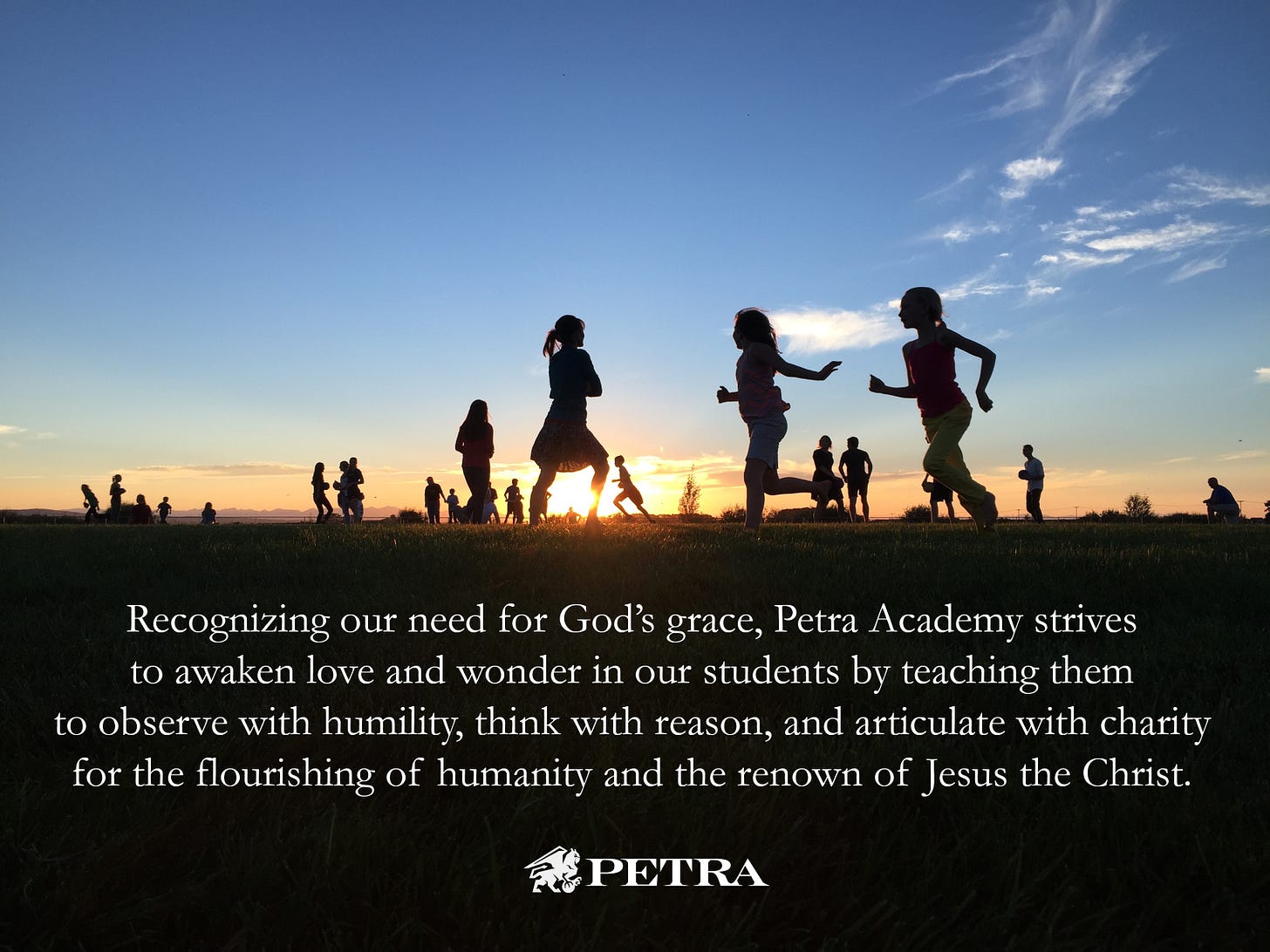Re-Enrollment: Four Considerations
Perhaps you read the news last month of the demise of the Pioneer Cabin Tree, the great Sequoia “tunnel tree” in Calaveras Big Trees State Park, 90 miles east of Sacramento. When I read the story, I found myself wondering why the tree’s collapse seemed so surprising to so many: take a tree and cut out two-thirds of its trunk, and what does one expect will happen when high rains and floodwaters come?
We shouldn't miss the metaphor as it relates to education. Up until the end of the 19th century, the "trunk" of an American student's tutelage was the teaching of humility and character, logic and reason, writing and rhetoric - all with a particular moral end in mind. This was the education of our first Presidents and many of those who laid and built upon the early foundations of our nation.
Today, however, our school systems have reduced learning to a pragmatic pursuit of a job. Progressives like John Dewey and others essentially cut out the heart of true education – of "paideia," the raising and enculturation of a moral and ethical civilization – opting instead for a gutted tourist stop along the way to employment.
Granted, one can argue that a good education is always useful, but it is also true that a useful education is not always good. Henry T. Edmondson III, writing in his book John Dewey and the Decline of American Education, clarifies:
“Aristotle criticizes the education of the Spartans precisely because their education was directed only toward ‘necessary and useful things,’ with little regard for what is ‘noble.’ In this light, it is notable that although historians grant the Spartans the respect they are due for their martial discipline, the same historians also note that the Spartans left no philosophical, literary, or political legacy, unlike their Athenian rivals.
Here we have a paradox: In making utility the chief goal of education, we sacrifice much of its usefulness. A merely utilitarian education is largely ineffectual precisely because it does not seek to make a student good, or at least to teach him what is good, or even to provide him with those principles that guide good behavior – all of which qualities are essential aspects of true utility.” (p. 80)
What’s a solution? Edmondson references Plato:
“Plato explains that the central thrust of education must be to cultivate intellectual and moral virtue because ‘virtue…would be a certain health, beauty, and good condition of the soul’; without an education directed to the soul, the student will be left with ‘vice’ which is a ‘sickness, ugliness and weakness’ of the soul.” (p. 82)
When was the last time “the central thrust of education to cultivate intellectual and moral virtue” was the discussion at the local, state, or national levels concerning our country’s education departments? When was the last time truth, goodness, and beauty (instead of just how our student(s) did on the latest test) was the topic at our own kitchen tables?
Later this week, re-enrollment opens exclusively for current Petra families. Obviously, we would love for 100% of our student body to re-enroll for next year. What will be our families' parameters for deciding whether to return in 2017-18? Here are four I sometimes hear from parents, along with a few thoughts for rumination:
1) Grades. One consideration may be whether a student is making A's (straight or otherwise), but let's avoid setting up that idol - in our kids' hearts or in our own - as a goal for their education. So many student issues (now and later) stem from a preoccupation with grades, and I find that nine times out of ten, when a student is so preoccupied, it is because her parents are as well. Grades can be a motivator, sure, as well as a means to evaluate some degree of mastery, yes, but, to paraphrase Mark 8:36, "...what does it profit a student to gain straight A's and forfeit his soul?" After all, in the words of author Walker Percy, "You can get all A's and still flunk life."
2) Workload. Another consideration is workload. As a parent, none of us enjoys seeing our kids struggle, but nothing teaches students perseverance and work ethic more than having to get over a high bar (and Petra's is one of the highest at every grade). If there is an epidemic in 21st-century parenting, it is giving into the temptation and tendency to intervene rather than coach, to teach to avoid struggle rather than lean into and work through it. And yet, those who trust the process and persevere (even and at times with tears) eventually join the ranks of those who take great satisfaction in having worked hard to accomplish something great. To graduate from Petra is not easy, but I have yet to meet an alumnus who regrets having done the work to do so.
3) Impact on family life. A third re-enrollment consideration is the impact on family life, for as I tell interested parents on our Tours on Thursdays, if we're not being impacted at home, something's wrong. Classical Christian education is not something to be compartmentalized and left at school over the weekend. It comes home with our students on a daily basis in the form of questions and answers about what is true, good, and beautiful; it makes observations about our lifestyles and calls into question our liturgies. Because so few of us were raised with classical Christian education as children ourselves, it pushes us as parents to humbly learn alongside our students all the things we were never taught, reinforcing or retarding a love of learning in our students, depending on our attitudes.
4) Cost. A final consideration is financial: can we afford to send our student(s) to Petra? Petra is not cheap (though I'm also told by parents with private education experience elsewhere that Petra is a "steal," particularly in a place like Bozeman), and while we in Montana have a choice of where to send our kids to school, we certainly do not have financial incentive to choose apart from the "free" government school system we all support with our tax dollars. Sometimes it's hard not to just give in and give up our kids to a school that we're already paying for, telling ourselves we'll deal with whatever comes up morally, emotionally, or spiritually with our student(s), all the while hoping for the best academically.
But perhaps a better question is this: can we afford not to send our student(s) to Petra? Where else in Bozeman are elementary, middle school, and high school students intentionally and unapologetically taught virtue and character by learning the basics of language (ancient and modern), reading the greatest books of literature, searching the lessons and ideas of history and philosophy, engaging in the mysteries of the sciences and mathematics, training in logical thinking and rhetorical expression, and participating in athletics and the making of art (dramatic, visual, or musical) - and all with and from a classical Christian worldview modeled and delivered by a caring faculty and staff?
When re-enrollment opens later this week, I hope you'll give thought to these four considerations. Make no mistake: we want your family excited about the benefits of classical Christian education and back at Petra next year. We also want you to rest assured that, after 21 years, we know who we are and want to be as a school, and this identity - this trunk of our tree - is one we have no intention of hollowing out.






